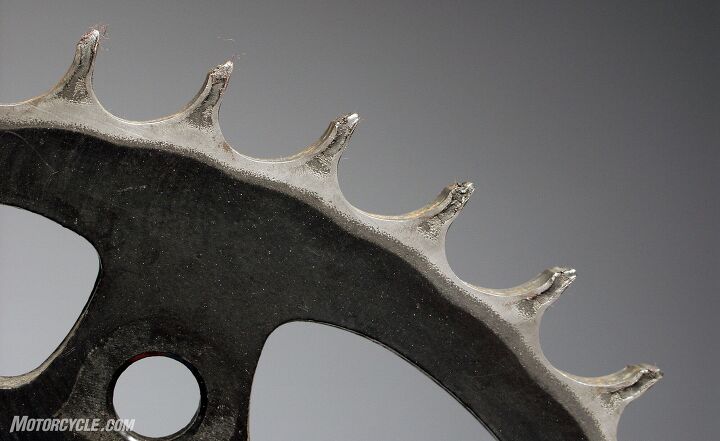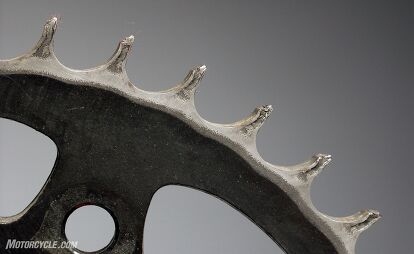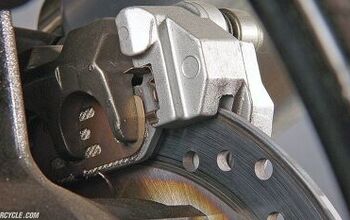How To Tell If Your Motorcycle Chain Needs Replacing

Do you have 10 seconds?
Updated February 2020
If you’re reading this, you’re probably wondering how you can tell when a motorcycle chain is worn out. Experienced motorcyclists develop an eye for the condition of their chain over time. You may see them casually check its tension with the flick of a finger or the toe of their boot. Regardless of the subtlety of their attentions, they are assessing the condition of their motorcycle. If you ever have any questions about the condition of your chain – aside from its slack – all you really need to do is spend a quick 10 seconds looking at it.
Has grease or crud built up on your bike’s chain? You need to clean and lubricate it. Visible rust? Clean and lube also. Suppose you’ve noticed that you need to tighten the chain’s slack a little more frequently than you used to. This is a sign that the chain is approaching the end of its useful life. Other signs are worn spots on the insides of the plates which usually signal that the chain is out of alignment. Look for matching worn spots on the sides of the sprockets’ teeth.
The quickest way to check the status of your drive chain is to get on your hands and knees and look at it. Inspect the sprocket’s teeth. They should not be arched on one side, like a cresting wave. If it is, you need to replace the sprocket, and your chain is probably toast, too. At the far back end on the rear sprocket, pull the chain away from the teeth parallel to the ground. A new chain will barely move. If you can pull it back to expose half a tooth or more, you need to replace the chain. You can perform this task just by spending a couple of extra seconds by the rear wheel when you’re checking its tire pressure before a ride. You do check, don’t you?
Take the time. A motorcycle chain has a difficult enough job dealing with any ham-fisted throttle inputs or botched downshifts you make – and that’s before we consider other shenanigans, like wheelies or burnouts. Take care of your bike, and it will take care of you.
Shop for Motorcycle Chains here
We are committed to finding, researching, and recommending the best products. We earn commissions from purchases you make using the retail links in our product reviews. Learn more about how this works.

Like most of the best happenings in his life, Evans stumbled into his motojournalism career. While on his way to a planned life in academia, he applied for a job at a motorcycle magazine, thinking he’d get the opportunity to write some freelance articles. Instead, he was offered a full-time job in which he discovered he could actually get paid to ride other people’s motorcycles – and he’s never looked back. Over the 25 years he’s been in the motorcycle industry, Evans has written two books, 101 Sportbike Performance Projects and How to Modify Your Metric Cruiser, and has ridden just about every production motorcycle manufactured. Evans has a deep love of motorcycles and believes they are a force for good in the world.
More by Evans Brasfield































Comments
Join the conversation
Not too difficult when you know what to do, Evans. I thought you'd take on a lighter approach like 1. When the bike won't change gear and cruises to a stop (after the chain's fallen off), 2. When you hear an almighty bang as the chain breaks and smashes some casing, etc. Kinda like a "weather report rock" hanging in the centre (center, if you insist!) of one of our country towns: If it's dry - it's fine, if it's wet - it's raining, covered in white - it's snowing, swaying - it's windy, rocking - there's an earthquake!
If only publications could go back to the days of editing their work for proper sentence structure...
Needs - future tense adverb. It needs to be repaired or replaced (soon).
Replacing - present participle. We are replacing it now.
From your friends, the grammar police...